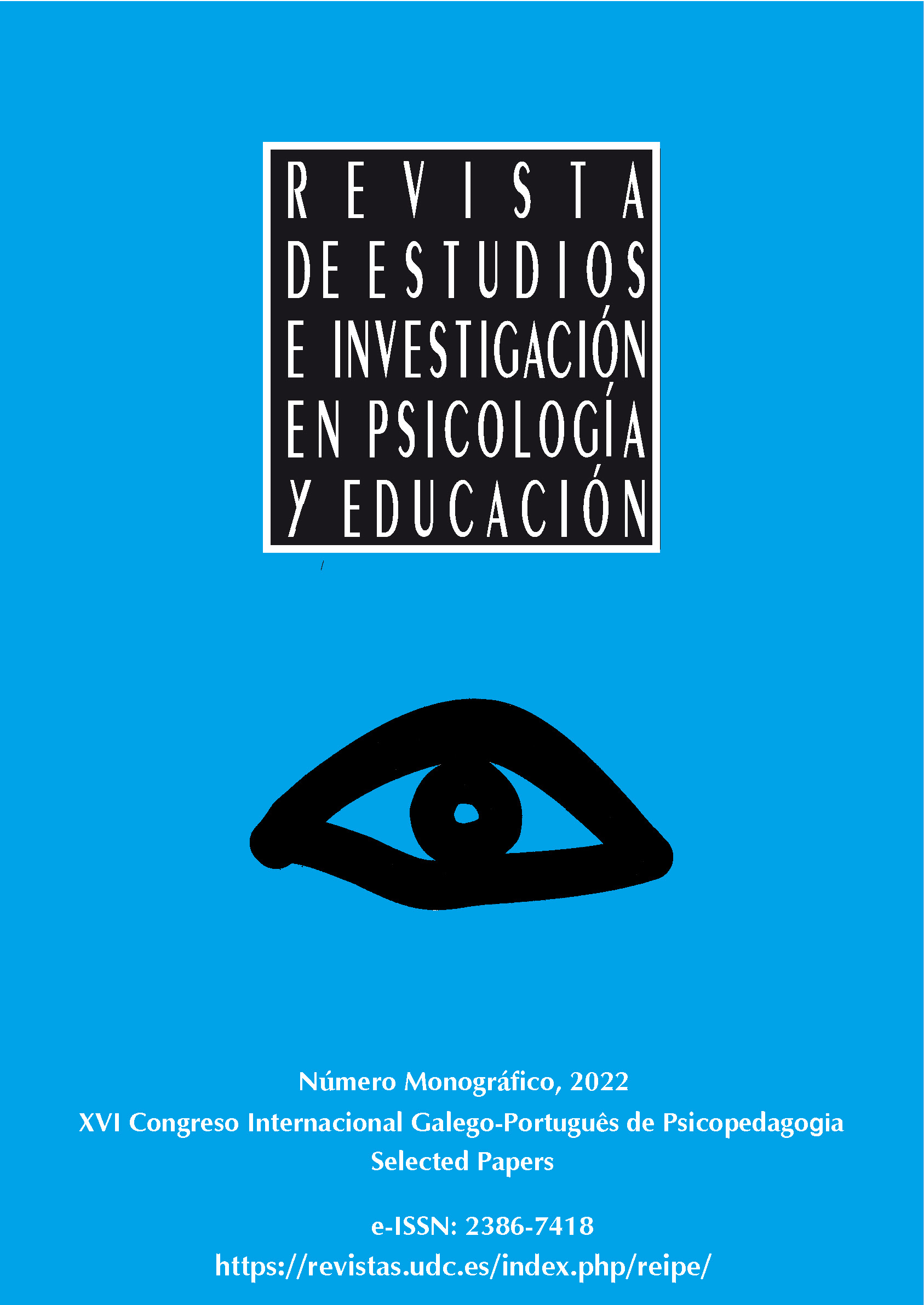El fomento de la implicación educativa familiar en casa a través del Programa IMPLICA2: evaluación de resultados
Contenido principal del artículo
DOI:
https://doi.org/10.17979/reipe.2022.9.0.8894Resumen
En este estudio se ha implementado (en cuatro sesiones durante un mes del curso académico 2019-2020) el programa IMPLICA2 dirigido a las familias con hijos que cursan 5º y 6º de Primaria de la Comunidad Autónoma de Galicia. Las actividades se realizaron en cuatro centros educativos, en los que han participado 253 familias distribuidas en cuatro grupos para cumplir con los requisitos establecidos en el diseño de cuatro grupos de Solomon (1949). Una vez implementadas las cuatro sesiones, se procedió a la evaluación de este proceso por parte del equipo investigador y las familias. A continuación, se realizó la evaluación de los resultados siguiendo el diseño previsto inicialmente y buscando las relaciones interactivas entre variables y las estructuras de relaciones que anulan las asociaciones entre algunas de ellas (Alvira Martín, 2002), considerando, para esta última, que el programa tendría una incidencia positiva sobre los elementos que determinan la decisión familiar de implicarse, según establece el modelo de Hoover-Dempsey y Sandler (1995). Los resultados permiten establecer que el programa presenta efectos distintos para padres y madres en aquellos aspectos relacionados con el foco de responsabilidad de la educación de los hijos (familia, escuela o familia y escuela), la orientación de metas familiares hacia el aprendizaje y/o el logro académico y la percepción de eficacia cuando ayudan a sus hijos en las tareas escolares.
Palabras clave:
Fuente de financiación:
Descargas
Detalles del artículo
Referencias
Alvira Martín, F. (2002). Metodología de la evaluación de programas. Centro de Investigaciones Sociológicas.
Blasco, J. (2018). ¿Los programas para fomentar la implicación parental en la educación sirven para mejorar el rendimiento escolar? Fundació Jaume Bofill, 1-30.
Campbell, D., y Stanley, J. (1980). Diseños experimentales y cuasi-experimentales en la investigación social. Amorrortu Editores.
Chen, H. T. (2005). Practical program evaluation. Assessing and improving planning, implementation and effectiveness. Sage Publications.
Cook, T. D., & Campbell, D. (1979). Quasi-experimentation. Rand McNally.
Desimone, L. (2002). How can comprehensive school reform models be successfully implemented? Review of Educational Research, 72(3), 433-479. https://doi.org/10.3102/00346543072003433
EEF. (2020). Parental engagement. Teaching & Learming Toolkit. 16th April. https://educationendowmentfoundation.org.uk
Epstein, J. L. (2010). School/family/community partnership: caring for the children we share. Phi Delta Kappan, 92(3), 81-96. https://doi.org/10.1177/003172171009200326
Epstein, J. L. (2001). School, family, and community partnerships. Westview Press.
Epstein, J. L., & Sheldon, S. B. (2019). The importance of evaluating programs of school, family and community partnerships. Aula Abierta, 48(1), 31-42. https://doi.org/10.17811/rifie.48.1.2019.31-42
Fernández, E., y Godás, A. (Eds.). (2021a). Cuaderno de familias. Implicación familiar y rendimiento académico en educación primaria. La efectividad de un programa para padres y madres. Servicio de Publicaciones de la Universidade de Santiago de Compostela. https://doi.org/10.15304/im.2021.1379
Fernández, E., y Godás, A. (Eds.). (2021b). Guía de implementación. Implicación familiar y rendimiento académico en educación primaria. La efectividad de un programa para padres y madres. Servicio de Publicaciones de la Universidade de Santiago de Compostela. https://doi.org/10.15304/im.2021.1366
Galindo, C., & Sheldon, S. B. (2012). School and home connections and children´s kindergarten achievement gains: the mediating role of family involvement. Early Childhood Research Quarterly, 27(1), 90-103. https://doi.org/10.1016/j.ecresq.2011.05.004
Hoover-Dempsey, K., & Sandler, H. (1995). Parent involvement in children´s education: why does it make a difference? Teacher´s College Record, 97, 310-331.
Jeynes, W. (2010). The salience of the subttle aspects of parental involvement and encouraging that involvement: implications for school-based programs. Teachers College Record, 112(3), 747-774.
Jeynes, W. (2012). A meta-analysis of the the efficacy of different types of parental involvement programs for urban students. Urban Education, 47(4), 706-742. https://doi.org/10.1177/0042085912445643
Kim, E. M., Sheridan, S. M., Kwon, K., & Koziol, N. (2013). Parent beliefs and children´s social-behavioral functioning: the mediating role of parent-teacher relationships. Journal of School Psychology, 51(2), 175-185. https://doi.org/10.1016/j.jsp.2013.01.003
Mattingly, D., Prislin, R., McKenzie, T., Rodríguez, J., & Kayzar, B. (2002). Evaluating evaluations: the case of parent involvement programs. Review of Educational Research, 72(4), 549-576. https://doi.org/10.3102/00346543072004549
Mertens, D. M. (1997). Research Methods in Education and Psychology. Sage Publications Inc.
Park, S., & Holloway, S. (2018). Parental involvement in adolescent´s education: an examination of the interplay among school factors, parental role construction, and family income. School Community Journal, 28(1), 9-36.
Park, S., & Holloway, S. D. (2013). No parent left behind: predicting parental involvement in adolescent´s education within a socio-demographically diverse population. The Journal of Educational Research, 106(2), 105-119. https://doi.org/10.1080/00220671.2012.667012
Patall, E. A., Cooper, H., & Robinson, J. C. (2008). Parent involvement in homework: a research synthesis. Review of Educational Research, 78(4), 1039-1101. https://doi.org/10.3102/0034654308325185
Sheldon, S. B. (2005). Testing a structural equation model of partnership program implementation and parent involvement. The Elementary School Journal, 106(2), 171-187. https://doi.org/10.1086/499197
Sheldon, S. B., & Van Voorhis, F. L. (2004). Partnership programs in U.S. schools: their development and relationship to family involvement outcomes. School Effectiveness and School Improvement, 15(2), 125-148. https://doi.org/10.1076/sesi.15.2.125.30434
Semke, C. A., Garbacz, S. A., Kwon, K., Sheridan, S. M., & Woods, K. E. (2010). Family involvement for children with disruptive behaviors: the role of parenting stress and motivational beliefs. Journal of School Psychology, 48(4), 293-312. https://doi.org/10.1016/j.jsp.2010.04.001
Sénéchal, M., & Young, L. (2008). The effect of family literacy interventions on children´s acquisition of Reading from kindergarten to grade 3: a meta-analytic review. Review of Educational Research, 78(4), 880-907. https://doi.org/10.3102/0034654308320319
Solomon, R. L. (1949). An extension of control group design. Psychological Bulletin, 46(2), 137-150. https://doi.org/10.1037/h0062958
Van-Streensel, R., McElvany, N., Kurvers, J., & Herppich, S. (2011). How effective are family literacy programs? Results of a meta-analysis. Review of Educational Research, 81(1), 69-96. https://doi.org/10.3102/0034654310388819
Whitaker, M., & Hoover-Dempsey, K. (2013). School influences on parent´s role beliefs. The Elementary School Journal, 114(1), 73-99. https://doi.org/10.1086/671061



